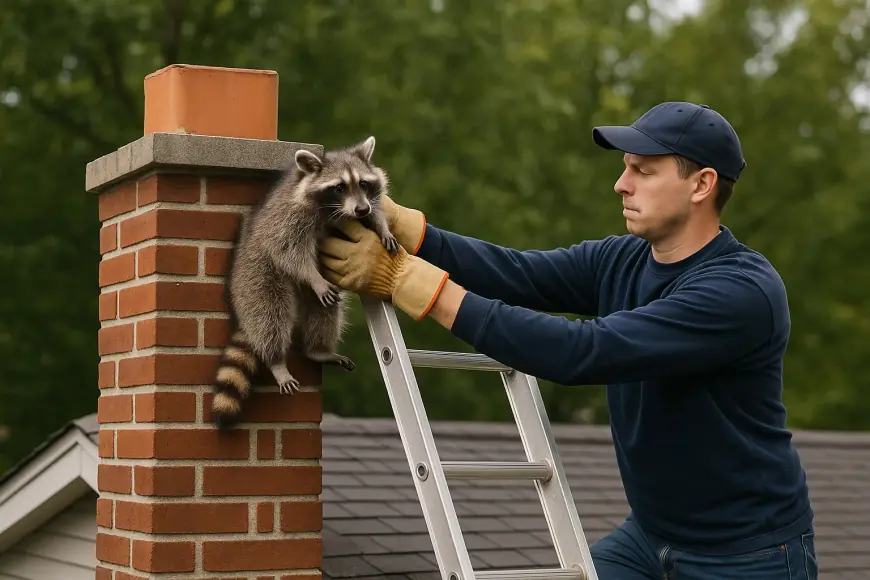When Should You Call for Chimney Animal Removal in Tulsa?
Protect your home with professional chimney animal removal services. We safely and humanely remove birds, raccoons, squirrels, and more—fast, reliable, and mess-free

Strange scratching sounds or sudden fluttering noises coming from your fireplace can be more than just a minor annoyance—they might be signs of uninvited animal visitors. In Tulsa, this is a surprisingly common issue, as birds, squirrels, and even raccoons often find chimneys to be ideal spots for nesting or shelter. If you’ve also noticed unpleasant odors drifting into your living room, it could mean an animal has taken up residence—or worse, become trapped. But how do you know when it’s time to pick up the phone and call a professional? Let’s talk about what signs to look for and why acting quickly is important when it comes to Chimney Animal Removal. Addressing the problem early can prevent property damage, reduce health risks, and ensure the animals are safely and humanely relocated.
Strange Sounds and Unwanted Activity
One of the first hints that an animal might have settled into your chimney is the sound. You might hear scratching, squeaking, or even a bit of scampering. Sometimes, it sounds like something is stuck and panicking. Baby animals, especially, can be surprisingly noisy. Raccoons and squirrels, in particular, tend to be active at dawn and dusk, so if you’re hearing commotion at those times, you probably have a visitor. Birds, on the other hand, might flutter and chirp through the day. If you notice these sounds coming from your chimney, it’s a good sign that you should get someone out to take a look.
Unpleasant Smells: Not Just a Nuisance
Sometimes, animals in your chimney can go unnoticed until you catch a whiff of something foul. The truth is, trapped animals may not survive long in such a confined space, and unfortunately, that can lead to a strong, unpleasant odor filling your home. Even if the animal is still alive, waste and nesting materials can create a musty, dirty smell. If your living room starts smelling a little “wild,” don’t ignore it. Smells often mean there’s been an animal up there for a while, and it’s time to get help before things get worse.
Blocked Chimneys and Fire Risks
Animals love to build nests, and your chimney provides a perfect spot. But all those twigs, leaves, and bits of trash can clog the flue. This isn’t just a problem for the animal—it can put your whole house at risk. Blocked chimneys can send smoke and dangerous gases like carbon monoxide back into your home. And if you use your fireplace while there’s a nest inside, you could even start a fire. If you notice your fireplace isn’t venting smoke properly, or if you see debris falling into your hearth, it’s best to get a professional out for a checkup.
Animal Sightings and Entry Points
Sometimes, you might actually spot the culprit. Maybe you see a squirrel tail disappear up the chimney or watch a family of raccoons climbing onto your roof. Or perhaps you notice feathers, droppings, or tracks around your fireplace. Even if you don’t see the animal itself, these clues mean your chimney is accessible and attractive to wildlife. It’s smart to have someone inspect for entry points and recommend ways to keep critters out for good.
"When it comes to animals in your chimney, ignoring the problem won’t make it go away. A quick call to a local expert can save you a lot of trouble—and keep your home safe and comfortable."
– Tulsa Homeowner
Quick Reference Table: Signs You Need Chimney Animal Removal
| Sign | What It Means | What To Do |
|---|---|---|
| Strange Noises | Scratching, scurrying, or chirping sounds | Call a removal service for an inspection |
| Bad Odors | Unpleasant, musty, or decaying smells | Seek professional help immediately |
| Debris or Blockages | Twigs, leaves, or droppings inside fireplace | Schedule a removal and cleaning |
| Animal Sightings | Seeing animals enter or leave chimney | Call for professional removal |
FAQs About Chimney Animal Removal in Tulsa
- Q: Is it safe to remove animals from the chimney by myself?
A: It’s best to leave this to the pros. Wild animals can be unpredictable and might bite or scratch. Plus, there’s a risk of damaging your chimney or getting stuck yourself. - Q: How do animals get into my chimney?
A: Usually, it’s through an open or damaged chimney cap. Animals are clever climbers and squeezers. Regular maintenance helps keep them out. - Q: Will removing the animal solve the problem for good?
A: Not always. To prevent a repeat, the entry points need to be sealed and sometimes a new chimney cap is needed. - Q: How quickly should I act if I suspect an animal is in my chimney?
A: Don’t wait! The sooner you call for help, the less likely you’ll deal with damage, odors, or health risks.
Conclusion: Don’t Wait to Get Help!
Animals in your chimney aren’t just noisy houseguests—they can bring mess, danger, and stress to your home. If you hear odd sounds, smell something off, or notice debris, it’s time to reach out to a trusted professional in Tulsa. Quick action can prevent bigger problems down the road, protect your family, and keep your fireplace running safely. When in doubt, call for expert Chimney Animal Removal and enjoy peace of mind all year round.
Read more : Tulsa Chimney Sweep
What's Your Reaction?
 Like
0
Like
0
 Dislike
0
Dislike
0
 Love
0
Love
0
 Funny
0
Funny
0
 Angry
0
Angry
0
 Sad
0
Sad
0
 Wow
0
Wow
0


















































